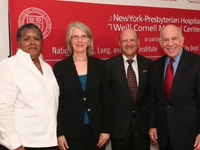
Speakers at the press event on COPD included (from left) Jacqueline Fox-Pascal, deputy director of the New York City Asthma Initiative, NYC DOH; Dr. Patricia Cassano, associate professor of nutritional epidemiology, Cornell University; Dr. James Kiley, director of the Lung Diseases Division of the National Heart, Lung and Blood Institute; and Dr. Ronald Crystal, chairman of the Department of Genetic Medicine and chief of the Division of Pulmonary and Critical Care Medicine at NewYork-Presbyterian/Weill Cornell.
Chronic Obstructive Pulmonary Disease (COPD) is hardly a household name. But experts say that by the year 2020, the respiratory illness will rank behind heart disease and cancer as the third leading cause of death in the United States.
In hopes of raising awareness for COPD—which may affect as many as 24 million Americans—NewYork-Presbyterian Hospital/Weill Cornell Medical Center, in partnership with the National Heart, Lung and Blood Institute (NHLBI) and the New York City Department of Health and Mental Hygiene, held a press event on Oct. 10 to detail epidemiology of a disease often referred to as "The Silent Killer."
Dr. Antonio M. Gotto Jr., dean of Weill Cornell Medical College, and Dr. Andrew Schafer, chairman of the Department of Medicine at the Medical College and physician-in-chief at NewYork-Presbyterian/Weill Cornell, welcomed reporters to the press briefing, which was held in the Weill Greenberg Center. Dr. Ronald Crystal, chairman of the Department of Genetic Medicine at the Medical College and chief of the Division of Pulmonary and Critical Care Medicine at NewYork-Presbyterian Hospital/Weill Cornell, hosted the event and discussed possible genetic determinants of COPD. Dr. James Kiley, director of Lung Diseases Division of the NHLBI, was on hand to present an overview of the disease, as was Dr. Patricia Cassano, an associate professor of nutritional epidemiology at Cornell University in Ithaca. Jacqueline Fox-Pascal, deputy director of the New York City Asthma Initiative at the New York City Department of Health and Mental Hygiene, also spoke at the briefing.
COPD, the umbrella term for chronic bronchitis, emphysema, and a range of other lung disorders, is a serious lung disease that restricts airways and destroys the elasticity of the lungs, making breathing difficult. Like many pulmonary diseases, smokers are especially susceptible to COPD, accounting for about 85 percent of COPD cases. Exposure to noxious particles and fumes make up the other 15 percent. Genetic factors also play an important role.
Earlier this year, the NHLBI awarded Weill Cornell a $14 million grant to fund genetic research in COPD. While biomarkers like elevated cholesterol levels aid in the early detection of heart disease, lung disease has no such indicators. Therefore, the identification of specific genes responsible for susceptibility and resistance to COPD will lead to improved prevention and treatment options.

Testing for lung function involves a simple breathing test using a spirometer.
COPD also seems to strike women at an increasing rate, which may be due to an alarming trend of women taking up smoking later in life. Cigarette smoke also appears to have a more severe effect on women's lungs, said Dr. Cassano, who focused on the disease's alarming epidemiology.
People with the earliest symptoms of COPD often ignore the warning signs, such as shortness of breath and excessive coughing, attributing the symptoms to advancing age, exertion, etc. This allows the disease to progress unabated. But a simple breathing test, known as spirometry, can quickly and easily gauge a patient's lung function and indicate any early signs of COPD.
"This ought to be part of your regular screenings," Dr. Crystal said. "It is just as important as checking your cholesterol and blood pressure."
Photography by Richard Lobell.

